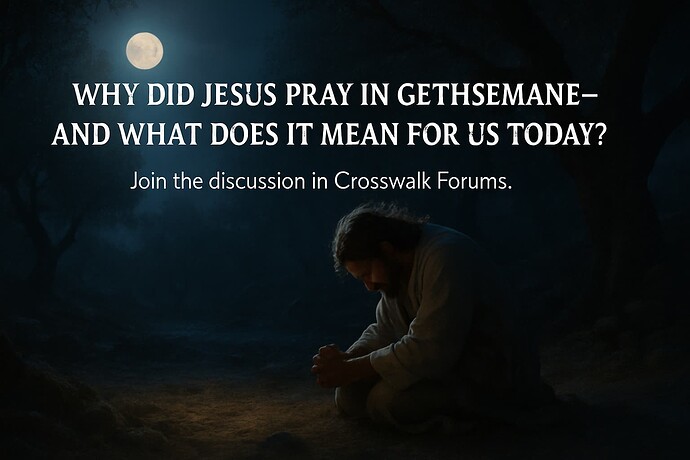Gethsemane was not a poetic backdrop for spiritual reflection. It was war. It was agony. It was the Son of God staring straight into the black furnace of divine wrath and saying, “I will drink it.” And if that scene does not shake us, we have not understood the Gospel.
Luke 22:42 “Father, if You are willing, remove this cup from Me. Nevertheless, not My will, but Yours be done.”
The Greek verb γενηθήτω (genēthētō), “be done,” is aorist passive imperative. He does not say, “I will try to submit.” He commands that the Father’s will take place, even at the cost of His own flesh.
This is not a moment of divine uncertainty. This is voluntary submission under infinite pressure. The Son knew the cup—τὸ ποτήριον—was not just physical suffering but the full measure of divine justice. He was not praying to escape pain. He was praying as a Man who would be made sin, so that the wrath due to you and me would fall on Him instead.
What Was in That Cup?
The cup was not just crucifixion. The Romans crucified thousands. The cup was the covenant judgment of God against sin. It is the same cup referenced in Isaiah 51:17:
“You who have drunk from the hand of the Lord the cup of His wrath…”
And Jeremiah 25:15:
“Take from My hand this cup of the wine of wrath, and make all the nations to whom I send you drink it.”
In Gethsemane, Jesus sees it. Every drop. Every curse. Every ounce of divine fury due to sin. And He does not run. He kneels. He prays. He bleeds.
Luke 22:44 “His sweat became like great drops of blood falling down to the ground.”
Ἐγένετο… ὡσεὶ θρόμβοι αἵματος—His agony was so intense that capillaries burst. This was not stress. This was substitution.
Politics and Pretend Obedience
Let’s speak plainly. Most “Christian obedience” today cannot survive a hard conversation, let alone a Roman cross. People flinch if they are unfollowed online, or if their social group frowns. But Christ sweat blood. Obedience cost Him everything.
We are told to be like Christ. Yet many in the Church fold the moment obedience to God might disturb political respectability. Entire denominations bow to political idols. Entire pulpits filter the Gospel through social safety. But Gethsemane was not safe.
If the will of God puts us at odds with public consensus or Marxist threats or racialized persecution or globalist idols, then so be it. That cup must still be drunk.
What It Means for Us
We are not called to admire Gethsemane. We are called to enter it.
Philippians 2:8 “He humbled Himself by becoming obedient to the point of death, even death on a cross.”
The Greek ἐταπείνωσεν ἑαυτὸν—He humbled Himself. Middle voice. No one forced Him. He lowered Himself into the cup.
If we follow Christ, we too must say, “Not my will.” Not my comfort. Not my vindication. Not my safety. Not my politics. Not even my dreams.
That prayer is not romantic. It is cruciform.
Have You Ever Had a Gethsemane?
Yes, brother. Many of us have. Some of us are in one now. We pray with tears, and God still hands us the cup. We ask for escape, and He gives us endurance. And in those moments, when every human comfort screams “No,” the Spirit teaches our soul to whisper what Christ roared:
“Not my will, but Yours.”
That whisper will break you. But it will also make you.
Obedience in Gethsemane is not the soft voice of resignation. It is the fierce cry of loyalty. It is not the sigh of defeat. It is the sword-point of surrender. It is not passive. It is holy violence against self-preservation.
The Final Word Is Not the Cup, But the Resurrection
Christ drank the cup. Every drop. And then He rose. The Father said “Yes” to the Son’s “Not My will.” And so for every one of us who prays like that in the fire, the tomb is not the end.
Hebrews 5:7–9 “In the days of His flesh, Jesus offered up prayers and supplications, with loud cries and tears… and being made perfect, He became the source of eternal salvation to all who obey Him.”
There is no shortcut. Gethsemane is the only path to Golgotha, and Golgotha is the only path to glory.
So yes, I have had a Gethsemane. You have too. And we will again.
When the cup is handed to us, we do not ask whether it is fair. We do not ask whether it fits into our political philosophy or national allegiance. We do not weigh it against public opinion or social convenience.
We drink it.
Because Christ drank His first.
And He did not leave even a drop behind.
Johann.
